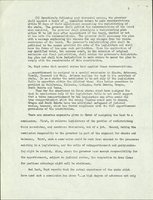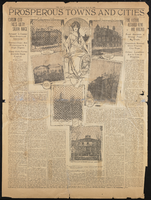Search the Special Collections and Archives Portal
Search Results
Richard B. Taylor Papers
Identifier
Abstract
The Richard B. Taylor Papers (1920-1993) document Richard Taylor's career and interests as a longtime Las Vegas, Nevada businessman and local historian, including his work as an executive at the Hacienda Hotel and Casino. The materials also include maps, development plans, and local publications for the Nevada communities of Laughlin and Mount Charleston, as well as publicity and promotional materials for these projects. As an amateur historian, Taylor also collected information on Las Vegas, Laughlin, and Mount Charleston.
Archival Collection

Transcript of interview with Chic Hecht by Julie Sefman, April 2, 1976
Date
Archival Collection
Description
Interview with Chic Hecht Julie Sefman on April 2, 1976. In this brief interview, Hecht talks about his time in the state senate working to bolster the budget with sales tax and gaming tax, starting a community college and health programs. He also talks about Pop Squires, a newspaper man and advocate for building Hoover Dam, who had a home on the site of Chic Hecht's clothing store on Fremont Street. Hecht also describes his time in the military and his involvement with the Military Intelligence Association.
Text

Summary report by the League of Women Voters on Legislative Reapportionment, "The Nevada Reapportionment Decision," October 1965
Date
Archival Collection
Description
League of Women Voters statement on legislative reapportionment and redistricting in Nevada.
Text
Robert B. Griffith Photograph Collection
Identifier
Abstract
The Robert B. Griffith Photograph Collection (approximately 1950-1970) contains black-and-white and color photographic prints, negatives, and slides of Las Vegas, Nevada including Fremont Street, Helldorado parades, and hotel and casino properties along the Strip including the Sahara Hotel and Casino, the Flamingo Las Vegas, the El Rancho, the Thunderbird Hotel and Casino, and the Hotel Last Frontier. Also included are photographs of Lake Mead Recreation Area and tunnel drilling within and near the Las Vegas Valley, Nevada. Other Nevada locations outside of Las Vegas include Reno, Virginia City, and Crystal Bay, Nevada.
Archival Collection
George Laurence Ullom Photograph Collection
Identifier
Abstract
The George Laurence Ullom Photograph Collection (1915-1974) contains photographic prints and negatives created by Las Vegas, Nevada photographer George Laurence "Larry" Ullom. Larry owned and operated Ullom’s Desert Art Studio, which was located in Las Vegas, Nevada. The bulk of the collection consists of Ullom's wedding chapel photography. The collection also includes his photography work for the Bureau of Reclamation, the Agricultural Extension Service, and the Associated Press, Atlantic News, and Acme news bureaus.
Archival Collection
Aplin Family Scrapbooks
Identifier
Abstract
The Aplin Family Scrapbooks (1927-1971) consists of four handmade scrapbooks compiled by Hilda Aplin. The scrapbooks contain photographs, correspondence, newspaper clippings, and handwritten captions. The majority of the collection focuses on Hilda and Charles Aplin’s involvement in the Fraternal Order of Eagles and Las Vegas Eagles Auxiliary #1213. Also included is a photograph album that details the family’s activities from 1927 to 1959, including notable locations around Las Vegas, Nevada such as Lake Mead, Hoover Dam, Mt. Charleston, and annual Helldorado parades.
Archival Collection
Introduction of "Outrageous Vegas": video
Date
Archival Collection
Description
Starts with a KVBC Channel 3 opening followed by "A Chorus Line" advertisement, and gold watch advertisement. Next segment starts with a packaged opening for KVBC Channel 3, a news story on the proposed national gas tax, a story on the secret Area 10 military base near Tonopah, Nevada, a woman who was hit by a street light, followed by more commercials by Nevada Savings, the Holiday Casino's gaming, entertainment, and buffet offers. The next segment starts with an economic study story. Anchor Gwen Castaldi introduces a story on Vegas World, Stupak and the new show "Outrageous Vegas," which was performed in a room used during the day as the casino's race and sports book. The commercial set following includes pieces on the Inperial Palace Auto Show, a spot for the Associated Podiatry Group, and a Chevron credit card commercial. The sports segment features stories on football coach John Robinson leaving USC, boxing in Las Vegas, the UNLV Running Rebels featuring Sidney Green, the NFL, Steve Garvey, a construction update on Cashman Field, skiing report, and a fishing report. Commercials in the next segment feature ads by the Las Vegas Sun, Stanwell Mortgage, and Fairway Chevrolet. The weather segment is followed by commercials by Royal Transmission, and the Las Vegas Hilton presents the Moulin Rouge du Paris production show. The show continues with a travel segment featuring b-roll from McCarran International Airport before ending. The tape continues with more news segments and a replay of the earlier show including the Stupak interview. Different segments and commercials include, Follies Bregere at the Tropicana, Gordon's Jewlers, Mineral Bank, news segments, American Denture Service, the announcement of the "Las Vegas Stars" as the new name for the AAA baseball team, NBA coverage, Las Vegas Dodge, Vons, Tom Jones at Caesars Palace, Nevada State Bank, and La Mesa RV. The tape continues with News 13 newscast. Stories include the shooting of Metro officer James McClarren and the preliminary hearing of his alleged shooter, 15-year-old Hector Vento, various other court cases, a story on rent increases at Bonanza Village, coverage of COMDEX Computer Convention, a story in the Gaurdian Angles security group pulling back services on the Las Vegas Strip, and a story on a cheating ring centered around Vegas World. The segment discusses Vegas World cooperation, security upgrades including cameras and video recorders, Metro's anti-cheating detail headed by Sgt. Dennis Caputo, and various cheating scams. The sports segment features a story on the UNLV Rebels football team and sophomore quarterback Randall Cunningham. Includes Channel 8's wrap up of the cheating scams at Vegas World as reported by Steve Shorr. Original media VHS, color, aspect ratio 4 x 3, frame size 720 x 486. From the Bob Stupak Professional Papers (MS-01016) -- Professional papers -- Audiovisual material -- Digitized audiovisual clips file.
Moving Image
Las Vegas High School Class of 1929 Collection
Identifier
Abstract
The Las Vegas High School Class of 1929 Collection (1921-1979) contains materials relating to the Las Vegas High School graduating class of 1929. Materials include a scrapbook with photographs, pamphlets, fliers, and newspaper clippings from the thirtieth, fortieth, forty-fifth, and fiftieth reunions, as well as poster boards and oversized photographs from the 1920s.
Archival Collection
International Food Service Executives Association Photograph Collection
Identifier
Abstract
The International Food Service Executives Association (IFSEA) Photograph Collection is comprised of panoramas, stills, and posed photographs of IFSEA members from 1914 to 1965.
Archival Collection

